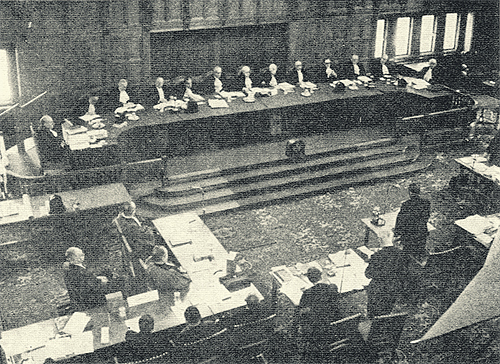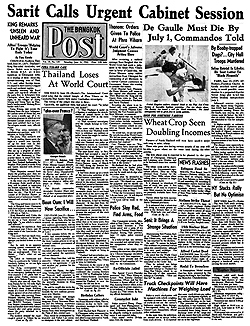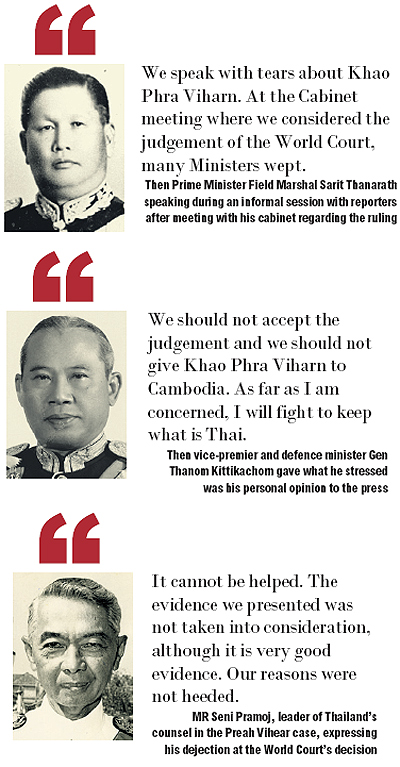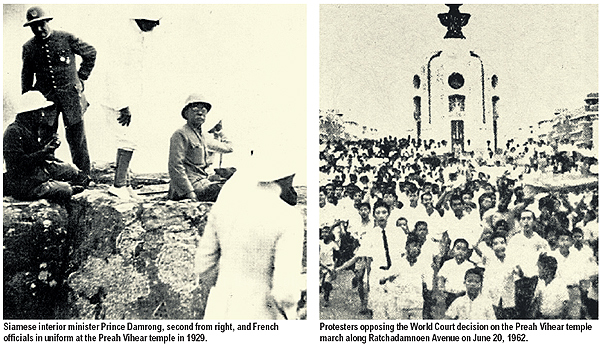As the Preah Vihear dispute heads back to the ICJ today, the row remains wrapped in patriotic overtones
Published: 15 Apr 2013
Bangkok Post
The 1962 ruling by the International Court of
Justice (ICJ) on the dispute between Thailand and Cambodia over Preah
Vihear temple was a historic one. It was the country's first and only
dispute to have reached the ICJ, also known as the World Court. The
territorial conflict was also more than a legal fight; it was an
emotional battle, a struggle to maintain national pride by both
claimants.
 World Court judges on the bench while considering the Preah Vihear ownership dispute between Thailand and Cambodia 51 years ago.
World Court judges on the bench while considering the Preah Vihear ownership dispute between Thailand and Cambodia 51 years ago.
Thailand's defeat at the Hague five decades ago caused then-prime
minister Sarit Thanarat to declare his compliance with the ruling to the
Thai public "with tears".
"We speak with tears about Khao Phra Viharn," Field Marshal Sarit
said on June 20, 1962, referring to the temple by its Thai name. "At the
cabinet meeting where we considered the World Court's judgment, many
ministers wept."
Then-foreign minister Thanat Khoman told reporters he felt the court's judgement was a "miscarriage of justice".
MR Seni Pramoj, leader of Thailand's counsel in the Preah Vihear
case, was also quoted in this newspaper saying the ruling surprised him.
"It cannot be helped," he said. "The evidence we presented was not
taken into consideration, although it is very good evidence. Our reasons
were not heeded."
He said the ICJ used the map as a deciding factor in the case,
although the Franco-Siam treaty of Feb 13, 1904 established the
watershed as the border line.
 The first page of the Bangkok Post ’s June 16, 1962 edition
highlighted the news of the World Court verdict that ruled in favour of
Cambodia in the Preah Vihear temple ownership dispute.
The first page of the Bangkok Post ’s June 16, 1962 edition
highlighted the news of the World Court verdict that ruled in favour of
Cambodia in the Preah Vihear temple ownership dispute.
This, he pointed out, brings about a strange situation: the watershed
belongs to Thailand but Preah Vihear, which is on the Thai side of this
watershed, belongs to Cambodia. "How can that be?" he asked.
Today, the Preah Vihear dispute is back at the ICJ and the conflict remains wrapped in nationalistic overtones.
The initial judgement is more than five decades old, but conflicts
and resentment fuelled by extreme nationalism lingers on both sides of
the cliff-top temple.
Cambodia has petitioned the court to reinterpret its 1962 ruling.
The oral hearings from both countries, the last step before the
ruling is delivered, presumably in October, begin today with a
presentation by Cambodia.
These two news items ran on the Bangkok Post's front page on
Saturday, June 16, 1962 (see transcripts on the right). A copy of the
paper cost 2 baht.
Thailand Loses At World Court
THE HAGUE, JUNE 15,1962 (REUTERS) : The International Court ruled
today that the ruined Temple Of Phra Viharn on the Cambodia-Thai border
falls under Cambodian sovereignty.
The voting of the judges was nine to three.
Cambodia, the applicant state, had asked the court "to judge and declare":
(1) That Thailand is under an obligation to withdraw the detachments
of armed forces it has stationed since 1954 in the ruins of the temple
and
(2) That territorial sovereignty over the temple belongs to Cambodia.
The court ruled also by nine votes to three that Thailand would have
to withdraw any military or police forces that might be stationed in the
temple.
By seven votes to five the court ruled that Thailand was under an
obligation to restore to Cambodia any objects that might have been
removed from the temple.
The court found that, in fact, Thailand had accepted a map of the Dangrek range showing the temple on the Cambodian side.
This map was an annex to the Franco-Siamese treaty of March 23, 1907,
fixing the frontier between Thailand and what is now Cambodia.
It had been drawn up as a result of the surveying activities of the mixed frontier commission.
It had never been formally approved by the mixed commission, which had ceased to function some months before its production.
"While there could be no reasonable doubt that it was based on the
work of the surveying officers in the Dengrek sector, the court
nevertheless concluded that, in its inception, it had no binding
character. It was clear from the record, however, that the maps were
communicated to the Siamese government as purporting to represent the
outcome of the work of delimitation."
"Since there was no reaction on the part of the Siamese authorities
either then or for many years, they must be held to have acquiesced; if
the Siamese authorities had accepted the map without investigation, they
could not now plead any effort vitiating the reality of their consent",
the judgment said.
The court recalled that a survey in 1934/1935 had established a
divergence between the map line and the true line of the watershed and
other maps had been produced showing the temple as being in Thailand.
"Thailand had nevertheless continued also to use and indeed to publish maps showing Phra Viharn as lying in Cambodia.
"Moreover, in the course of the negotiations for the 1925 and 1937
Franco-Siamese treaties, which confirmed the existing frontiers and in
1947 in Washington before the Franco-Siamese conciliation commission it
would have been natural for Thailand to raise the matter; she did not do
so.
"The natural inference was that she had accepted the frontier at Phra
Viharn as it was drawn on the map, irrespective of its correspondence
with the watershed line.
"The court found it was unnecessary to consider whether the line as mapped did in fact correspond to the true watershed line."
Vice-President Alfaro (Panama) and Judge Sir Gerald Fitzmaurice
(United Kingdom) appended separate opinions, while the judges Moreno
Quintana (Argentina), Wellington Koo (China) and Sir Percy Spender
(Australia) appended dissenting opinions.
Thanom: Orders Given To Police At Phra Viharn
After receiving a radioed message from Bangkok that the World Court
had made a judgment in the Khao Phra Viharn case in favour of Cambodia,
the Prime Minister today cabled instructions from Chiengrai for
summoning of all Ministers to a special Cabinet conference in Government
House this evening to consider this matter.
Field Marshal Sarit Thanarath, the Prime Minister, will return to the
capital this afternoon with Their Majesties the King and the Queen from
visits to Thai and allied forces stationed in Northeast and North
Thailand.
Revealing the above in an informal talk with reporters this morning,
General Thanom Kittikachorn, the Vice Premier and Defense Minister,
commented:
"I had feared that we would be treated with injustice. The World
Court judges include nationals of Communist countries. Nationals of some
countries which we consider as friends have turned to enemies.
"In actual fact, we are not under the jurisdiction of the World
Court. We did not renew our application for membership after the first
application had expired."
Gen Thanom went on: "Foreign experts have inspected the Khao Phra
Viharn area and given the view that it is impossible, when the question
of the watershed is taken into consideration, for the temple to be in
Cambodian territory. The judges never came here to look at the terrain."
He disclosed that he had given certain orders to border police
stationed in Khao Phra Viharn area but he could not divulge what the
orders were.
Giving what he stressed is his personal opinion, the Defense Minister
said: "We should not accept the judgment and we should not give Kao
Phra Viharn to Cambodia.
"As far as I am concerned, I will fight to keep what is Thai.
"What the Government view is, I do not know yet. It will depend on this evening's meeting.
"A report will be made to the people."





No comments:
Post a Comment